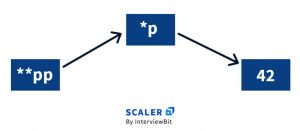

*(asterisk) is used with pointer variable when dereferencing the pointer variable, it refers to variable being pointed, so this is called dereferencing of pointers. What is dereferencing a pointer in C?ĭereferencing is used to access or manipulate data contained in memory location pointed to by a pointer. Both (void*)0 and ((void*)0) are address constants. (void*)0 is a null pointer constant, whose value is a null pointer of type void*, so by the semantics of parenthesized expressions ((void*)0) also has a value that is a null pointer of type void*. The operator used for dereferencing or indirection is _ Explanation: * is used as dereferencing operator, used to read value stored at the pointed address. Which operator used for dereferencing or indirection for any variable is _?Ģ. NULL pointer dereference issues can occur through a number of flaws, including race conditions, and simple programming omissions. Can we dereference a NULL pointer?Ī NULL pointer dereference occurs when the application dereferences a pointer that it expects to be valid, but is NULL, typically causing a crash or exit. … When we dereference a pointer, then the value of the variable pointed by this pointer will be returned. When indirection operator (*) is used with the pointer variable, then it is known as dereferencing a pointer. What happens when you dereference a pointer? There is only one drawback, which is that polymorphism based on void * is unsafe: once you cast a pointer to void *, there is nothing that prevents you from casting that void * to the wrong pointer type by mistake. Because the void pointer is used to cast the variables only, So pointer arithmetic can’t be done in a void pointer. What can’t we do with a void * pointer?Ĭorrect Option: B. For example, memory pointed to by int * is interpreted as an int. Memory itself has no type, and it is pointers that contains the type information.
#Indirection requires pointer operand how to
No, because you don’t know how to interpret the data contained by the corresponding memory space.


What is a void pointer can you dereference a void pointer without knowing its type?.If multiple threads of execution access the same instance of shared_ptr without synchronization and any of those accesses uses a non-const member function of shared_ptr then a data race will occur the shared_ptr overloads of atomic functions can be used to prevent the data race. The managed pointer is the one passed to the deleter when use count reaches zero.Ī shared_ptr may also own no objects, in which case it is called empty (an empty shared_ptr may have a non-null stored pointer if the aliasing constructor was used to create it).Īll specializations of shared_ptr meet the requirements of Cop圜onstructible, CopyAssignable, and LessThanComparable and are contextually convertible to bool.Īll member functions (including copy constructor and copy assignment) can be called by multiple threads on different instances of shared_ptr without additional synchronization even if these instances are copies and share ownership of the same object.

The stored pointer is the one accessed by get(), the dereference and the comparison operators. This feature can be used to point to member objects while owning the object they belong to. The object is destroyed using delete-expression or a custom deleter that is supplied to shared_ptr during construction.Ī shared_ptr can share ownership of an object while storing a pointer to another object. the last remaining shared_ptr owning the object is assigned another pointer via operator= or reset().the last remaining shared_ptr owning the object is destroyed.The object is destroyed and its memory deallocated when either of the following happens: Several shared_ptr objects may own the same object. Std::shared_ptr is a smart pointer that retains shared ownership of an object through a pointer.


 0 kommentar(er)
0 kommentar(er)
